新目标七年级下册英语语法点总结
新目标七年级英语(下册)重点难点考点精讲及练习,高分突破

七年级英语重点难点精细讲解及练习(下册)Unit 1 ~ 4[考点聚焦]I. 词组归纳1. 在邮局和电子游戏中心之间_________,2. 在公用电话对面____________3. 带我的狗去散步_________________ ,4. 打的去…… _________________5. 玩得高兴_________________ ,6. 在附近_________________7. 直走_________________ ,8. 向左转_________________9. 在图书馆的右边________________ ,10. 欢迎来到花园小区!____________ 11. 一幢有一个美丽花园的房子_________,12. ……的开始__________________ 13. 一个消遣的好地方_________________,14. 去我家的路__________________ 15. 有点儿,稍微___________________ ,16. 在晚上___________________ 17. 吃草和树叶__________________ ,18. 想要,愿意__________________ 19. 青椒___________________ ,20. 冰茶___________________21. 也,还,而且___________________ ,22. 比萨快递___________________ 23. 点一份比萨___________________ ,24. 看菜单____________________ 25. 售货员_________________ ,26. 警官_________________27. 银行职员_________________ ,28. 警察局_________________29. 出去,外出_________________ ,30. 想成为_________________31. 与……一起工作__________________ ,32. 把某物给某人_________________ 33. 从某人处得到某物______________ ,34. 穿一套白色的制服____________ 35. 与某人交谈__________________ ,36. 参加校园剧的演出_____________ 37. 有一份护士的工作给你_____________,38. 5~12岁的儿童______________ II. 句型归纳1. _______ _______ a supermarket? No, there isn’t.2. _______ the park? It’s _______ Center Street.3. _______ the hotel? It’s next _______ the bank.4. _______ _______ he like koala bears? Because they’re _______ of cute.5. _______ _______ ________ pizza would you like?I’d like a pepperoni pizza, please.6. _______ _______ pizza would she like? _______ likes a medium pizza.7. _______ would they like _______ their pizza?They’d like mushrooms, onions and olives.8. _______ _______ he do? He’s a reporter.9. _______ _______ he? He’s a doctor.10. _______ _______ she want to _______? A sales assistant.III. 考点归纳1. 关于问路及回答的常用语1) Excuse me, is there a ...?Excuse me, where is the ...?Excuse me, which is the way to the ...?Excuse me, can you tell me the way to the ...?Excuse me, can you tell me how to get to the ...?Excuse me, how can I get to the ...?2) Go/Walk straight (along the street).Go/Walk along/up/down the street.Go/Walk along/up/down the street to the end.Go/Walk along/up/down the street about ten minutes.Turn (to the) left/right.Turn left/right at the traffic lights.Turn left/right at the second turning.(= Take the second turning on the left/right.)2. There’s a bank on the Central Street. 在中心路有一个银行。
七年级英语下册第三单元讲义重点短语语法归纳及练习(新)人教新目标版
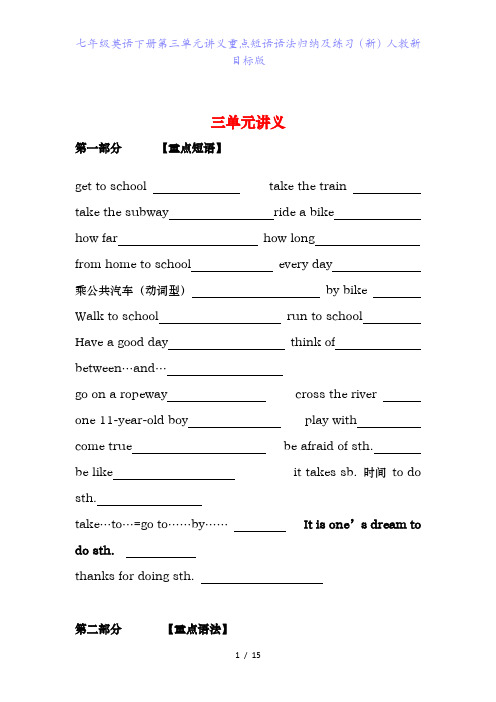
三单元讲义第一部分【重点短语】get to school take the traintake the subway ride a bikehow far how longfrom home to school every day乘公共汽车(动词型)by bikeWalk to school run to schoolHave a good day think of between…and…go on a ropeway cross the riverone 11-year-old boy play withcome true be afraid of sth.be like it takes sb. 时间to do sth.take…to…=go to……by…… It is one’s dream to do sth.thanks for doing sth.第二部分【重点语法】一、交通方式表达法1.动词型: take +限定词(a/an/the)+交通工具(单数)(take 译为乘坐,动词型通常放在句中)如:take a /the bus , take a/the subway, take a/the train 例:Tom takes a bus to school.翻译(Linda坐地铁去图书馆):Lindalibrary.◆有的交通工具不需要用take,如walk to/drive to /ride to/flyto/◆Walk to +地点=go to ...on foot走路去…如:I walk to school every day.=I go to school on foot.注意:如果后面接地点副词here , there , home 等介词to应省去2.介词型:1)by+交通工具(单数)(中间无任何修饰词,介词型通常位于句末)如:by bus/by subway/by train例:Tom goes to Beijing by train.2)in/on +限定词(a/an/the)+交通工具(单数)(位于句末,特别强调在自行车上用on)如:in a /the car, in a /the boat, in a/the taxiOn a /the bus, on a /the train, on a /the subway例:My father goes to work on a bus/in a car.注意:1.对交通工具提问用:how(怎样)如:My father goes to work on a bus(对划线部分提问)How does your father go to work?【试一试】1. I think you can _____to the new park. It’s a little far.A. by busB. take a busC. onfoot D. walk2. –-How does your brother usually go to school?–- ______car.A. ByB. InC. OnD. With3. I often go to school _____ my father’s car and go back home ______ foot.A. in; onB. by; byC. by; inD.on; by4. Jim often goes to school ______ bike. But today he goes to school ______ the school bus.A. on; byB. by; byC. by; onD. on; on二、交通方式之间的互换。
七年级英语人教版(新目标)(最新版)下学期期末复习:知识点归纳
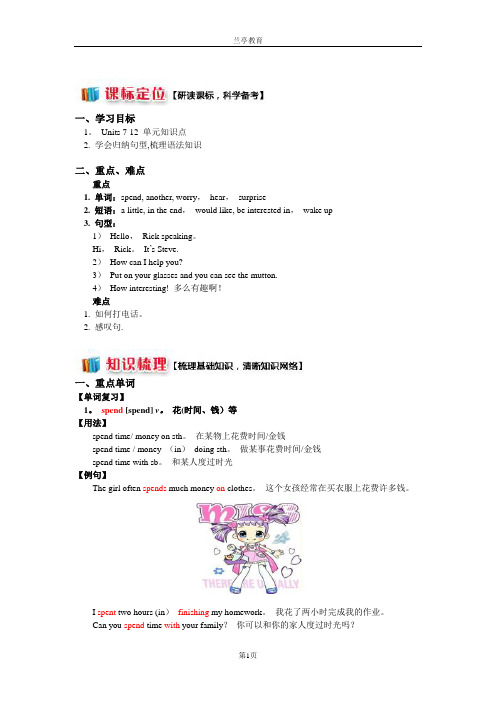
一、学习目标1。
Units 7-12 单元知识点2. 学会归纳句型,梳理语法知识二、重点、难点重点1. 单词:spend, another, worry,hear,surprise2. 短语:a little, in the end,would like, be interested in,wake up3. 句型:1)Hello,Rick speaking。
Hi,Rick。
It’s Steve.2)How can I help you?3)Put on your glasses and you can see the mutton.4)How interesting! 多么有趣啊!难点1. 如何打电话。
2. 感叹句.一、重点单词【单词复习】1。
spend [spend] v。
花(时间、钱)等【用法】spend time/ money on sth。
在某物上花费时间/金钱spend time / money (in)doing sth。
做某事花费时间/金钱spend time with sb。
和某人度过时光【例句】The girl often spends much money on clothes。
这个女孩经常在买衣服上花费许多钱。
I spent two hours (in)finishing my homework。
我花了两小时完成我的作业。
Can you spend time with your family?你可以和你的家人度过时光吗?【拓展】(1) pay常用来表示“付款”,主语是人,其后用介词for。
sb。
pays money for sth. = sb。
spends money on/ doing sth。
(2)cost 表示“花钱”,主语为物。
sth。
costs sb. money. = sb. pays money for sth。
= sb。
spends money on/(in)doing sth。
新目标七年级英语下第三单元sectionB词汇和语法
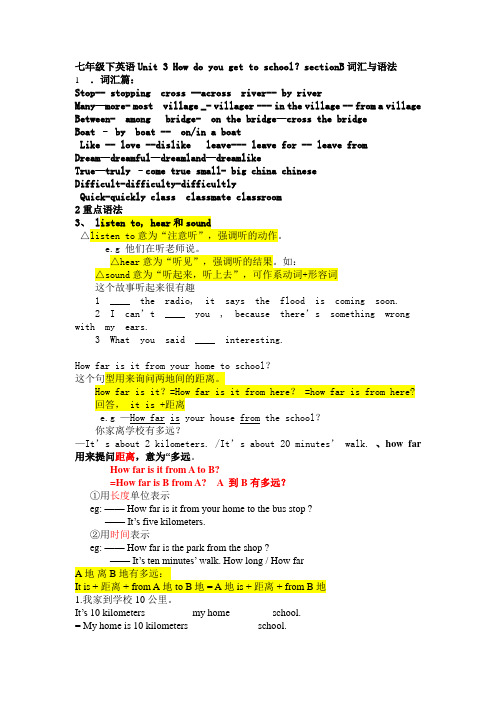
七年级下英语Unit 3 How do you get to school?sectionB词汇与语法1.词汇篇:Stop-- stopping cross --across river-- by riverMany—more- most village _- villager --- in the village -- from a village Between- among bridge- on the bridge—cross the bridgeBoat – by boat -- on/in a boatLike -- love --dislike leave--- leave for -- leave from Dream—dreamful—dreamland—dreamlikeTrue—truly –come true small- big china chineseDifficult-difficulty-difficultlyQuick-quickly class classmate classroom2重点语法3、 listen to, hear和sound△listen to意为“注意听”,强调听的动作。
e.g 他们在听老师说。
△hear意为“听见”,强调听的结果。
如:△sound意为“听起来,听上去”,可作系动词+形容词这个故事听起来很有趣1 ____ the radio, it says the flood is coming soon.2 I can’t____ you , because there’s something wrong with my ears.3 What you said ____ interesting.How far is it from your home to school?这个句型用来询问两地间的距离。
How far is it?=How far is it from here? =how far is from here?回答, it is +距离e.g —How far is your house from the school?你家离学校有多远?—It’s about 2 kilometers. /It’s about 20 minutes’ walk.、how far 用来提问距离,意为“多远。
新目标英语七年级下册讲义—Unit 11 How was your school trip

新目标七年级下册Unit 11 How was your school trip? 讲义一、重点单词k 挤奶2. cow .奶牛3. horse 马4. feed 喂养;饲养5. farmer 农民;农场主6. quite 相当;安全7. anything (常用于否定句或疑问句)任何东西;任何事物8. everything 一切;所有事物9. grow 种植;生长;发育10. farm 农场;务农;种田11. pick 采;摘12. excellent极好的;优秀的13. countryside 乡村;农村14. yesterday 昨天15. flower花16. worry 担心;担忧17. luckily 幸运地;好运地18. sun 太阳19. museum博物馆20. fire 火灾21. painting .油画;绘画22. exciting adj.使人兴奋的;令人激动的23. lovely可爱的24. expensive 昂贵的25. cheap 廉价的;便宜的26. slow缓慢的;迟缓的27. fast 快地(的)28. robot .机器人29. guide 导游;向导30. gift 礼物;赠品31. dark 黑暗的;昏暗的32. hear(heard)听到;听见自测表:二、短语归纳1.school trip 学校旅行2.go for a walk 去散步k a cow 给奶牛挤奶4.ride a horse 骑马5.feed chickens 喂鸡6.talk with 和......交谈7.take photos /a photo拍照st week上周9.ask some questions问一些问题10.quite a lot 相当多11.show sb. around sp.带某人参观某地12.learn about 了解13.grow strawberries种植草莓14.from...to... 从…到…15.pick some strawberries摘草莓16.take sth home带…回家17.climb the mountains 爬山18.visit my grandparents看望我的祖父母19.go fishing 去钓鱼20.so much 如此多的21.go to the zoo去动物园22.go to a farm去农场23a lot of fun很多乐趣24.play games 做游戏e out 出来26.go to the countryside去乡下27.science museum科学博物馆28.visit a museum 参观博物馆29.play chess with sb... 和…下棋30.buy sth for sb为某人买31.be interested in…对…感兴趣32.all in all总的来说33.not...at all 一点也不,根本不三、句型集萃1. How + be…? + like? ……怎么样?2. How do/does+主语+feel about...? 对......感觉如何?3. too many + 可数名词复数太多的……4.teach sb. how to do sth. 教某人怎样做某事5.quite + a / an + 形容词+可数名词单数= a + very + 形容词+可数名词单数一个相当/ 很……6.buy sth. for sb.=buy sb. Sth.为某人买东西7.It’s +形容词+to do sth. 做某事是......的8.sound+形容词听起来......四、词汇、句型讲解及拓展1.How was your school trip?学校旅行怎么样?【解析】How+be+主语?=What be+主语+like?意为“….怎么样?”★★★本句的答语:It was great./It was OK./It was/wasn’t good….【拓展】how是疑问副词,意为“怎么样,怎么”,用来构成特殊疑问句,主要用法如下:1)询问如何做某事,或者做某事方式。
初中英语人教新目标七年级下册Unit 8语法复习There be 句型讲解

七年级英语下册Unit 8There be 句型讲解认识There be 句型表示“有”,某地/某时存在某人/某人如:There is a book in the table.桌子上有一本书。
There are some apples in the basket.篮子里有一些苹果。
一、There be 句型基本用法结构:There be +主语+某地➡肯定句:There is/are +主语+ 其他➡否定句:There is not/ are not+主语+其他➡一般疑问句:Is /Are there +主语+其他肯定回答:Yes, there is/are.否定回答:No, there isn't/aren't.➡特殊疑问词:How many +可数名词复数+are there+其他How much+不可数名词+is there +其他常用询问“.......有多少人”,即How many people are there in your family?你家里有几口人?How many students are there in your class?你们班有多少同学?变成否定句和一般疑问句时,要注意句子中some要变成any例:There is some water on Mars.一般疑问句: Is there any water on Mars?二、have/has与there be 区别have/has:指所属关系,某人/某物拥有某物there be : 指客观存在,某地/某时存在某人/某物例:I have a new watch.我有一块新手表。
She has two daughters.她有两个儿子。
There is a watch on the table.餐桌上有一块手表。
There are many students on the playground.操场上有许多学生。
《新目标英语》七年级下册重点句型、短语归纳(2)

Unit 8 I’d like some noodles.Ⅰ、Useful expressions:1. I’d like = I would like 我想要2. what kind of … 哪种……3. beef and tomato noodles 牛肉西红柿面4. what size bowl of … 多大碗的……5. he’d like = he would like 他想要6. a small/medium/large bowl of … 一份儿小碗的/ 中号的/ 大碗的……7. a large glass of orange juice一大杯橙汁8. green tea/black tea绿茶/红茶9. at the House of Dumplings 饺子馆10. have some great specials 有些很棒的特色餐11. lunch special 特色午餐12. get dumplings 吃饺子13. strawberry and banana ice cream 草莓香蕉冰淇淋14. a small orange juice 一小杯桔子汁儿15. a bowl of beef and tomato noodles 一碗番茄牛肉面16. what size of dessert 多大尺寸的甜品17. order sth. 点(菜或者饮料……)Ⅱ、Sentences:1. I’d like some noodles . 我想要点面条。
2.What kind of noodles would you like? 你想要哪种面条?3.What size bowl of noodles would you like? 你想要多大碗的面条?I’d like a small/medium/large size bowl. 我想要一小/中/大碗。
4. What kind of noodles do you have? 你这儿有哪种面条?3.What size do you have? 你这儿有多大份儿的?4.I like … and …我喜欢……和……5.I don’t like … or … 我不喜欢……和……6.Special 1 has beef and onions. 一号特色餐有牛肉和洋葱。
新目标(Go for it)版七年级英语下册各单元知识点总结
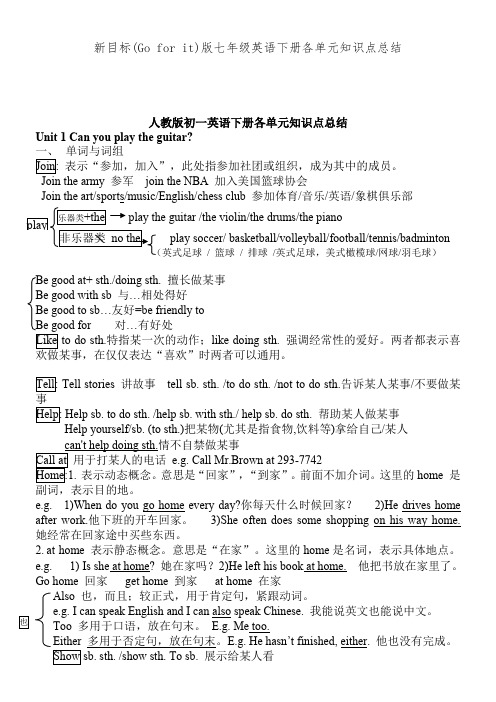
新目标(Go for it)版七年级英语下册各单元知识点总结人教版初一英语下册各单元知识点总结Unit 1 Can you play the guitar?一、 单词与词组表示“参加,加入”,此处指参加社团或组织,成为其中的成员。
Join the army 参军 join the NBA 加入美国篮球协会Join the art/sports/music/English/chess club 参加体育/音乐/英语/象棋俱乐部play soccer/ basketball/volleyball/football/tennis/badminton / 篮球 / 排球 /英式足球,美式橄榄球/网球/羽毛球)Be good at+ sth./doing sth. 擅长做某事Be good with sb 与…相处得好Be good to sb …友好=be friendly toBe good for 对…有好处特指某一次的动作;like doing sth. 强调经常性的爱好。
两者都表示喜讲故事 tell sb. sth. /to do sth. /not to do sth.告诉某人某事/不要做某帮助某人做某事Help yourself/sb. (to sth.)把某物(尤其是指食物,饮料等)拿给自己/某人e.g. Call Mr.Brown at 293-7742意思是“回家”,“到家”。
前面不加介词。
这里的home 是e.g. 1)When do you go home every day?你每天什么时候回家? 2)He drives home after work.他下班的开车回家。
3)She often does some shopping on his way home. 她经常在回家途中买些东西。
2. at home 表示静态概念。
意思是“在家”。
这里的home 是名词,表示具体地点。
初一英语(蛟川书院)英语新目标七年级下册语法等重点复习整理
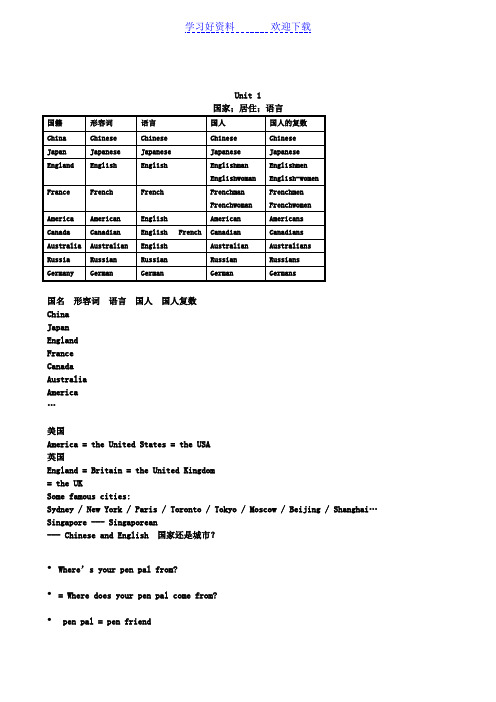
Unit 1国家;居住;语言国名形容词语言国人国人复数ChinaJapanEnglandFranceCanadaAustraliaAmerica…美国America = the United States = the USA英国England = Britain = the United Kingdom= the UKSome famous cities:Sydney / New York / Paris / Toronto / Tokyo / Moscow / Beijing / Shanghai…Singapore --- Singaporean--- Chinese and English 国家还是城市?•Where’s your pen pal from?•= Where does your pen pal come from?• pen pal = pen friend• city --- cities country --- countries• language --- languages •BeijingNingboHangzhou Jiaochuan•Where does you live?•He lives in Tokyo.•one of the countries (is…)其中一个•What language do you speak?•I speak Chinese.•Does she have any brothers or sisters?•Can you write to me soon?•Please write to me soon.•Please write soon.•Please write and tell me about yourself.•I think China is a very interesting country.I don’t think China…否定前置语言不可数:•speak a little / some / much / little French•go to the movies (with sb.) 固定短语•too difficult 太难了•on weekends = on Saturdays and Sundays•at school•write an e-mail about yourself• likes and dislikes• speak Spanish• write to sb. = write a letter to sb.• on December 1 / on the morning of Dec.1• have a good time• = have (great) fun• = enjoy oneself 根据主语(myself / yourself / himself / herself / ourselves / yourselves / themselves) • My favorite subject is P.E.• My favorite subjects are P.E. and math.•like doing sth. / like to do sth.经典句型:There are three people in my family. They are my father, my mother and I.Unit 2地点;方位;问路• post office• library• hotel• restaurant• bank• supermarket• street• pay phone• park•…--- Thank you (very much). / Thanks a lot.--- You’re welcome. / That’s all right. / That’s OK. / Not at all. 不用谢就近原则(在…有什么吗?)•Is there …?•Yes, there is. / No, there isn’t.•Are there …?•Yes, there are. / N o, there aren’t.• on Fifth Avenue• near here = in the neighborhood• around here• around me• on Bridge Street• on Center Street• turn left / right (at New Park) 在哪个点• go straight down (Bridge Street)•on the left / right (of…)在…左边/右边•on your left / right 在你左边/右边•go / walk along this street•Here’s the hotel. Here’s Bridge Street. description words•an old hotel / a new park• small / big / clean / dirty / busy / quiet • come over to = come to• watch a video• a quiet street off Fifth Avenue (away from) •I’ll see you at 2:30.• show me the way• at the second crossing / turning•enjoy the city’s quiet streets and small parks • take a walk through the park• Across from the park is an old hotel.• a small house with an interesting garden • This is the beginning of the garden tour. • read from the beginning of the book• a good place to have fun•It’s in there.ⅹIt’s there / here.• tour guide 导游;向导;旅游手册;导向图•on a busy street• I know your are arriving next Sunday.• Let me tell you the way to my house.let sb. do sth.• Take a taxi from the airport.• pass a bank on your right 经过•go down Long Street• turn left at NewPark• I hope you have a good trip.• far from 离…远• arrive at the airport小地方 /• arrive in Beijing大地方•reach Beijing• get to Beijing•arrive/reach/get heretherehomeUnit 3动物名;习性;喜好及理由•tiger• elephant• koala• dolphin• panda• lion• penguin• giraffe•…•Let’s see the lions first.• Why do you want to see the lions? •Because they’re cute.(kind做名词:种类)• a kind of 一种•all kinds of 所有种类;各种各样•many kinds of 许多种类•different kinds of 不同种类•kind of = a little = a little bit 有点…• pretty = quite 相当…• so如此too太really真的+ 形容词adj. • be friendly to sb. = be kind to sb.• Pandas are my favorite animals.•= My favorite animals are pandas.•= My favorite animal is pandas.• pretty smart / kind of interesting• more than once 多于一次• Why not?• South Africa (Africa名 = African形)• What other animals do you like?• like to do sth.• play with sb.• eat grass(不可数)•She’s very shy, so please be quiet.• during the day = in the day• at night• eat leaves (leaf --- leaves knife --- knives)• He usually sleeps and relaxes 20 hours every day. (relax --- relaxes) •give description of…• be afraid of sb. / sth. / doing sth. 害怕…• He is twelve years old.• He is a twelve-year-old boy.• an eight-year-old girl• an eighteen-month-old baby•Isn’t it beautiful? Yes, it is. / No, it isn’t.•Isn’t he cute? Yes, he is. / No, he isn’t.•Aren’t you a student?Yes, I am. / No, I’m not.Unit 4职业名;工作地点;工作特点;喜好理由;将来理想•shop assistant• doctor• actor• reporter• policeman• waiter• bank clerk• student•…• want sth. = would like sth.• want to do sth. = would like to do sth.• want sb. to do sth. = would like sb. to do sth.• want to be an actor• want to be young and beautiful• That sounds really interesting. •policeman --- policemen •policewoman --- policewomen•What does he do?• = What is he?•= What’s his job?问职业三种方式:•What do you do?•= What are you?•= What’s your job.• have a lot of new things to do • want to be a reporter•work with people and money • get their money from me •get sth. from …从…拿/得到•count money 数钱•make much money 赚很多钱•wear a white uniform 单•wear uniforms 复• in the day = during the day 在白天• at night 在夜间• interesting but kind of dangerous •Thieves don’t like me. (thief --- thieves) • like talking to people (talk to / with sb.) • meet interesting people• ask them questions• work late•I’m busy when people go out to dinners.• give me their money• = give their money to me(give sb. sth = give sth. to sb.) = show用法•sometimes有时候• every day每天 / everyday日常的在工作:•be at work = be working• Where does your sister work?• She works in a hospital.• danger名--- dangerous形• a small red hat / a big blue T-shirt 一顶小红帽(形容词顺序)•exciting fun interesting• boring busy difficult tiring累人的• dangerous危险的--- safe安全的•区别和拼写:different / difficult•be interested in… 对…感兴趣• (Are you interested in this job?)• a busy but exciting job• other interesting people•招聘广告标题:Wanted / Help Wanted• want ads招聘广告• work late / work hard / meet people• talk with people / write stories• work for a magazine• work for us as a reporter• sing and dance• work with other young people• want to be in the school play• work evenings and weekends• call Frank at 5555-3256•小小区别:need需要/ want想要•可数:newspaper (s)• in the newspaper 在报纸上面(指内容)•news新闻(a piece of news一则新闻)• an international school for children of 5-12• skills• want a P.E. teacher to teach soccer• want a music teacher to teach (the) guitar• teach sb. sth. (teach us/me English)• work / study hard• be ill in hospital 住院• work in the hospital 在医院•be late for class / school 上课上学迟到• be busy with sth. 忙于某事• be busy doing sth. 忙于做某事I’m busy with my homework.I’m busy doing my homework.Unit 5进行时;现在分词;动词短语;介绍照片;地点介词现在进行时的标志:•now• right now现在,此刻(区别于just now用过去时)• Look!• Listen!•It’s 10 o’clock (now).• Where is Tom?...• these days 这些天•In the first photo…现在分词的构成:•swimming / running / getting / putting…•What’s he doing? He’s reading.•What are you doing? I’m watching TV.• activity activities:doing (one’s) homeworkwatching TVcleaning the roomeating dinnerreadingwriting a lettertalking on the phone (take / talk)activities:writing a letter购物shop --- shopping去购物go shoppingswimming at the pooleating (错误eatting)places:on the playgroundat the swimming poolat the mallin the libraryat schoolat home•That sounds good.• This TV show is boring.• This video is boring.• Do you want to go to the movies? • When do you want to go?• Let’s go at 6 o’clock.• Sure.• What is happening?发生•wait for sb. / sth.等待•What are they talking about?谈论• Who are they talking to?与…聊天•what’s = what is•he’s = he is•she’s = she isThanks for sth. / doing sth.Thank you for sth. / doing sth.Thanks for your letter and the photos.Thank you for helping me.Thanks for your help.a letter from Lucy to Tom•Here is / are…Here are some of my photos.Here is the money.I’m with my sister.be with sb. 与某人在一起in the first / second / next / last photoa photo of my familyThis is … and that is …由近及远• take photos with a camera• let sb. do sth. (Let me help you.)• put on 穿上(动作)(Put on your coat. It’s cold outside.)• wear 穿着(状态)(She is wearing a dress today.)• in 修饰在名词后面(the girl in red / the boy in a hat / the woman in a yellow dress) She is in a red skirt.= She is wearing a red skirt.• surf --- surfing冲浪•familyMy family has a shower.家庭My family are all at home today.家人以下这些词做主语,谓语动词用单数:someone 某人;有人somebodyno one 没有人nobodyanyone 任何人everyone 每个人•come / go / leave / arrive可现在进行时表将来Unit 6问天气;现在进行时;问进展怎么样;描述正在做的行为;播报描述天气•What’s the weather like in Beijing?= How’s the weather in Beijing?•It’s sunny / windy / cloudy / snowy / rainy.•It’s raining / snowing.rain / snow 做动词时:It often snows in Harbin.It is raining outside.It often rains heavily in summer.rain / snow 做名词时不可数:There’s much rain here.There’s little snow in this city.• What was the weather like yesterday?• How was the weather yesterday?• It was sunny / windy / rainy / cloudy…overcast 阴天的•Happy New Year!•Nothing much. 没什么。
新目标初一英语下知识总结及练习答案讲解

七年级英语提高训练一Unit 1 Can you play the guitar学校:年级:姓名:一.基础知识梳理A: Can you draw B: Yes, I can. I want to join the art club.C: Can you swim D: No, I can’t.E: Oh, can you sing F: Yes, I can. I want to join the music club. D.考点语法:情态动词can的使用1.表示能力,表“会”“能”,指脑力或体力方面的“能力”--- I can play basketball well.2.表示许可----You can’t play here.3.表“请求”--- Can you help me二.基础知识运用1.根据首字母和句意提示完成单词;1. He likes playing basketball. So he wants to join_______ the basketball club.2. ---Can you speak_____ English ---Yes, I can.3. I can paint. I want to join the art club.4. I can play the guitar and the volin. I can sing and dance, talk.5. Do you have time on the weekend .6. If you are a good musician, you can be in the music festival festival.7. What can you do in the school show8. Which do you like, English or Chinese2.单项选择B 1. ----Can you ----Yes. I am in the art club now.A. swimB. paintC. danceD. singD 2. ----Can you play the guitar ----Yes. But I can’t play it very.A. badB. badlyC. goodD. Wellvery good相当于very nice. 意思是非常好,用来修饰名词.例子:The book is very good/nice.这本书非常好.very well 意思也是非常好,但它有两个用途:1.表示人的身体很好,属于形容词性短语,仅限于表示人的身体好,假如你跟一个人偶遇,他就想问问你认识的某人身体咋样,那你就可以回答说谁谁谁very well.例子:My mother is very well.我妈妈身体很好.2.还可以用来表示很好地,这时候它就相当于一个副词,可以用来修饰动词和形容词.例子:He study English very well.他的英语学得非常好.A 3. ---- ----Chess club.A. What club do you want to joinB. Can you play the chessC. What can you doD. Do you join the chess clubB 4. ----Do you know Lang Lang ---Yes. He is a . He can play the piano very well.A. playerB. musicianC. teacherD. singerC 5. ----How is your school trip ----Great. I can you the photos.A. makeB. findC. showD. buyD 6. ----Can you me with my English ---OK.A. learnB. speakC. teachD. Help help with 帮助B 7. ----Can your friend, Tony, the trumpet 喇叭;小号----Yes. He likes it very much.A. play; playsB. play; playingC. plays; playsD. plays; playingyour friend和Tony之间是同位关系,实际上该句子相当于:Can your friend play the trumpet 当表示喜欢某事物,而且以前就喜欢,还可能持续,用Like doing sth当表示想要,欲做某事用like to doB 8. ---What does he like doing after school ---Playing .A. gameB. chessC. the tennisD. Swimminggamesc 9. ----Can I help you --- I want to buy a book.A. No, thanksB. Thanks a lot 十分感谢C. Yes, please.D. You’re welcome 不客气thank you 或者Thanks a lot用这个回答A 10. Can he EnglishlA. speakB. talkC. sayspeak 意为“说话、讲话”,后面主要接语言.如:He can speak English and a little Chinese.talk 意为“谈话、讲话”,如果只有一方对另一方说话时,一般用talk to;如果双方或多方交谈,多用with. say 意为“说”通常跟讲者所说的话一起使用Please say hello / thank you to your mum.B 11. My brothers want the chess club.A. to speakB. to joinC. joinswant to do想做某事,want意思是“想要”,主语常是人I want to go to schoolwant doing 需要做某事,want意思是“需要、要求”,主语常是物The house wants repairingC 12. ----Can you play the guitar ----A. No, I canB. Sure, I can’tC. Yes, a little.B 13. My sister can very well. So she wants to join the club.A. swims; swimmingB. swim; swimmingC. swimming; swimC 14. _______club do you want to joinA. WhenB. WhereC. WhatC 15. I don’t want to play _____violin. Let’s go and play ________ ping-pong.A. a; theB. the; aC. the; /接球类和棋类时不加冠词,如:play football, play ping-pong,play chess;接乐器时加定冠词the,如play the violeen 中国的乐器前不加冠词;3. 交际技能及运用C D A F B EB.Mrs. Black: What can I do for you, young manDavid: I like sports. I want to Join your Sports Club .Mrs. Black: OK. What’s your full name, pleaseDavid: David Cooper.Mrs. Black: HOW OLD ARE YOUDavid: 14.Mrs. Black: What’s your favorite sport Can you play tennisDavid: Yes, I can.Mrs. Black: Do you like playing basketballDavid: Yes, but I CAN’T play it very well.Mrs. Black: Why do you want to join the club, may I askDavid: Because I really want to keep healthy and meet/make friends .Mrs. Black: Oh, I see. Can I have your phone number and email addressMrs. Black: OK. Welcome to our sports club.You can come hereon Sunday .at, in , on, 和by 表示时间的区别:at指时间表示:1时间的一点,一时刻:They come home at surprise at noon, at midnight, at ten o’clock, at daybreak, at dawn.2 较短的一段时间;可指某个节日或认为一年中标志大事的日子;His grandfather died at seventy-two.At the beginning middle, end of that month he was sick.He went home at Christmas at New Year, at the spring Festival, at night, at midsummer.In指时间表示:1在某个较长的时间如世纪,朝代,年,月,季节,及泛指的上午,下午和晚上等内;He died in the holidays.He was born in 1942.2 在一段时间之后;He will come round in a day or two.I will finish it in three hours.On指时间表示:1具体的时日和一个特定的时间,如某日,某节日,星期几等;He will come to meet us on our arrival.On May 4th On Sunday, On New Year’s day, On Christmas Day, there will be a celebration.2 在某个特定的早晨,下午或晚上;He arrived at 10 o’clock on the night of the 5th.He died on the eve of victory.3 准时,按时;If the rain should be on time, I should reach home before dark.In 表示比较大的地方,2虽然是很小的地方,如果说话人住在那里,也可用in.商店,机关,学校等,若看作一个地点point用at,若看作一个场所place用in.I met him at the post-office.I’m now working in the post-office.On表示地点,一般指与面或线接触:1“在…上面”He put the book on the table and sat on the chair.The picture was hanging on the wall.2 “在……旁边”New work is on the Hudson River.Xiamen is on the river.He lives in a house on the river.1. near, by, beside, at表示“在附近”的区别:near 表示相对的“近”,实际距离可能还很远;例如:There is a post office near our school.Suzhou is near Shanghai.By和beside都表示“靠近”,实际距离不可能很远,但beside比by更具体的表示出“在旁边”的意思;例如:There is a big tree by the river.He was sitting beside her.by还可以表示“尺寸,距离”;例如:They escaped death by inches.Do you see the hole high up in the wall, about 18 cm by 9三.能力提高训练Rick is a fat man. He gets up late晚in the morning . He has a big breakfast every morning. He has some meat, three or four eggs and some pieces of bread面包. He drinks two glasses of milk, some apple juice, a cup of coffee and some fruit. His wife, Vicky, has a cup of tea, a piece of bread and a banana for breakfast. Rick doesn’t like any ball games. He thinks they are too hard for him, but he likes listening to the music and watching TV and he doesn’t do any housework家务. Vicky plays sports every day. In fact, she is in a swimming club. So she is very healthy .1. K2. A3. D4. H5. B6. C7. I8. E9. G 10. J2. 阅读理解Do you like children Do you have free空闲的time in the afternoon We need a babysitter保姆for our son. He’s five years old. The working time is Monday to Friday, 3:00 pm to 6:pm. $ 5 an hourWe need help with: Looking after our son; Reading to him; Playing with him.You must work at our house. We live in Changchun, near the Culture Square文化广场. Please call Mr. Green at 5638—2949.根据短文内容选择正确答案1. From Monday to Friday, the babysitter can work ______ every day.A. one hourB. two hoursC. three hoursD. four hours2. Which is NOT the work that the babysitter needs to doA. Cooking for the child.B. Playing with the child.C. Reading books to the child.D. Looking after the child.3. The babysitter must work _______.A. at the babysitter’s houseB. at Miss Green’s school.C. at Mr. Green’s house.D. at the Culture Square4. The child in the ad is _______.A. 15 months oldB. 15 years oldC. 5 months oldD. 5 years old5. If ______, you can get the job.A. you like children, but you have no time in the afternoonB. you like children, but you d on’t know how to play with themC. you’re good with children and you’re free in the afternoonD. you can play with children but you don’t know how to readC A CD CA下面是俱乐部的广告,以及学生对自己能力的表述;这些学生应该加入什么社团请在横线上写下对应的俱_______ Kate: My friends and I really like helping others._______ Mike: Cooking is boring. I love music and I can play the piano._______ Gina: I can’t play sports, and I can’t cook, but I can speak a little French._______ Jack: I can play chess a little. But I really want to be a chess player._______ S cott: I like Jet Li and I’m really interested in Chinese kung fu.1.E2.B3.A5.DB根据俱乐部广告信息,判断正误. 正确的写“T”,错误的写“F”6. If you like Chinese kung fu, you can call Mr. King at 8491-3086.7. You can learn to speak French every Thursday.8. We can join the volunteer club to make the old people happy.9. I love cooking and I can cook in Room 302 every Tuesday.10. If you like drawing pictures, you can join the music club.6.F 7.F 8.T家庭作业一、句型转换1. I can join in the Chinese speech contest. 改为一般疑问句___can_____ ____i____ ____join___ in the Chinese speech contest2. Can Jack and his brother speak Chinese 做否定回答No,____they___ _____can’t___.3. Jimmy can sing Jay Chou's songs. 改为否定句Jimmy __can’t_____ __sing_____ Jay Chou's songs.4. He wants to join the math club. 就划线部分提问_what_____ ___club_____ ___does____ he __want____ to join5. His sister can play computer games. 就划线部分提问____what___ ___can_____ his sister ____do____二.阅读理解Mr Brown and Mrs Brown are teachers. But they teach in different schools. Every day Mrs Brown goes home early. Mr Brown's school is not near their home. He goes home late. Mr Brown likes Chinese. He often goes to Chinese classes. One day he has a friendly talk with a Chinese student and goes home very late.He opens the door and says, "Sorry, my dear. I am too late today, but I..." Mrs Brown is not in the room."That's strange 奇怪. She likes watching TV." "She doesn't like going out in the evening." "But where is she now." Mr Brown looks here and there. Then he sees a note on the table. It says, "Don't make any excuse this time, I am going out to see my friends. Don't wait for me."b 1. Mr Brown and Mrs Brown are teachers, and they workA. in the same schoolB. in two different schoolsC. in different countriesD. in one schoolb 2. Mr Brown goes home late becauseA. he doesn't like his homeB. his school isn't nearC. he likes dancingD. he likes school very muchc 3. One day, Mr Brown has a friendly talk withA. Mrs BrownB. his studentsC. a Chinese studentD. his good friendc 4. Mr Brown wants to say sorry to Mrs Brown, but Mrs BrownA. doesn't want to listen and goes to bed earlyB. isn't at home to wait for his excuseC. is sleeping and can't hear himD. is very angry and leaves home for everb 5. Mr Brown thinks that Mrs Brown _____ in the evening.A.often goes outB. stays at homeC. is cookingD. doesn't watch TV二、补全对话,一空一词A: Hi, Emma What time do you usually get up onB: Well, I get up at six forty-five.A: Do you have at homeB: Yes, I usually have an egg, a hamburger and some fruit.A: _____ do you go to schoolB: Classes begin_____ at eight-thirty, so I go to school at eight-ten.A: How classes do you have every dayB: Seven. Four in the morning and in the afternoon.A: 7. ____what___ do you do after schoolB: We sports. We like volleyball very much.A: When do you getB: I school at five-thirty and I get home at six o’clock。
七年级下册英语语法点总结(新目标)

七年级下册英语语法点总结Unit 1 Where’s your pen pal from?一.短语:1 .be from = come from 来自于----2.live in 居住在---3.on weekends 在周末4 .write to sb = write a letter to sb 给某人写信;写信给某人5 .in the world 在世界上in China 在中国6.pen pal 笔友14 years old 14岁favorite subject 最喜欢的科目7.the United States 美国the United Kingdom 英国New York 纽约8.speak English 讲英语like and dislike 爱憎9.go to the movies 去看电影play sports 做运动二.重点句式:1 Where’s your pen pal from? = Where does your pen pal from/2 Where does he live?3 What language(s) does he speak?4 I want a pen pal in China.5 I can speak English and a little French.6 Please write and tell me about yourself.7 Can you write to me soon?8 I like going to the movies with my friends and playing sports.三.本单元的国家,人民、语言对应。
1 Canada---- Canadian---- English / French2 France------ French------French3 Japan------Japanese----Japanese4 Australia----Australian----- English5 the United States------ American---- English6 the United Kingdom---British----- EnghishUnit 2 Where’s the post offic e?一.Asking ways: (问路)1.Where is (the nearest) ……?(最近的)……在哪里?2.Can you tell me the way to ……?你能告诉我去……的路吗?3.How can I get to ……?我怎样到达……呢?4.Is there …… near here / in the neighborhood? 附近有……吗?5.Which is the way to ……?哪条是去……的路?二.Showing the ways: (指路)1. Go straight down / along this street. 沿着这条街一直走。
新目标英语七年级(下)Unit 1知识要点归纳

gui t ar 吉他s i ng 唱歌s wi m 游泳dance 跳舞dr aw 画ches s 国际象棋s peak 说(某种语言);说话j oi n 参加,加入cl ub 俱乐部,社团t el l 讲述;告诉wr i t e 写作;写字pi ano 钢琴dr um 鼓vi ol i n 小提琴m us i ci an 音乐家t al k 谈话s how演出;表演j oi n t he ar tcl ub 参加美术小组/俱乐部pl ay t he gui t ar 弹吉他t el l s t or i es 讲故事be good w i t h...和……相处很好;善于应付……m ake f r i ends 结交朋友be good at ...擅长于……hel p s b.wi t h st h.在某方面帮助某人on t he weekend 在周末1.I want t o j oi n t he ar t cl ub.我想参加美术俱乐部。
wantt o do s t h.想做某事例如:I w ant t o go t o t he z oo t hi s Sat ur day.我想这周六去动物园。
2.C al l M r .B r ow n at 293-7742.拨打293-7742找布朗先生。
cal ls b.at ...拨打……找某人例如:Pl eas e cal l ourm anager at 512-3423.请拨打512-3423找我们的经理。
情态动词can 的用法can 表示“能够做某事”,也可以表示请求。
其否定式为can ’t,表示“不能够做某事”,或者表示推测,意为“不可能”。
例如:1.Can you be her e at s i x o ’cl ock t om or r ow m or ni ng?(表请求)你明天早上6点到这里可以吗?2.I can ’tgo s hoppi ng wi t h you t oday.(表示“不能够”)我今天不能陪你去购物。
七年级英语下Unit8知识点归纳与复习人教新目标版

新目标七年级下Unit 8 知识点归纳与复习单元知识清单一、重点单词:1. w ld 表示意愿2. n dle 面条3. b f 牛肉4. c bb ge 洋白菜5. p t t 土豆6. sp c l 特色菜7. dr nk 饮料8. l ge 大的9. s ze 大小10. b l 碗11. j ce 果汁12. d mpl 饺子13. p rr dge 粥14. t 茶15. r ce 米饭16. s p 汤17. f sh 鱼,鱼肉18. r s n 原因19. m n 菜单二、必会短语:1. like 想要2. a of 一碗……3. kind of 什么种类4. size 什么尺寸5. orange 橘汁6. tea 绿茶7. a menu 制定菜单8. nouns 可数名词9. nouns 不可数名词三、应知语法和句式:1. would like to do sth 想要做某事,如:想要吃面条would like noodles2. 提问种类时用:3. 提问号码、尺寸、大小时用:4. 要区别可数与不可数名词,如:一些牛肉八个土豆5. Monday的缩写形式是:知识点1 词语运用Ⅰ. 根据句意和首字母完成下列单词。
1. –What size dessert do you want?-A l one.2. Annie can’t have dinner with us. Do you know the r?3. I have b every day. This kind of meat is good for our health.4. Is there any orange j in the bottle?5. I want a large size bowl of rice but for my brother a m one is enough (足够的).6. I’m very thirsty, please give me something to d.7. I’d like a bowl of noodles with o.8. There are many v in the market.9. He often goes to the house of noodle and o a large bowl of noodle.10. I like black shoes in this s . I think they are not big or too small for me.Ⅱ.根据汉语提示及句意完成句子。
《新目标英语》七年级下册 重点句型短语归纳
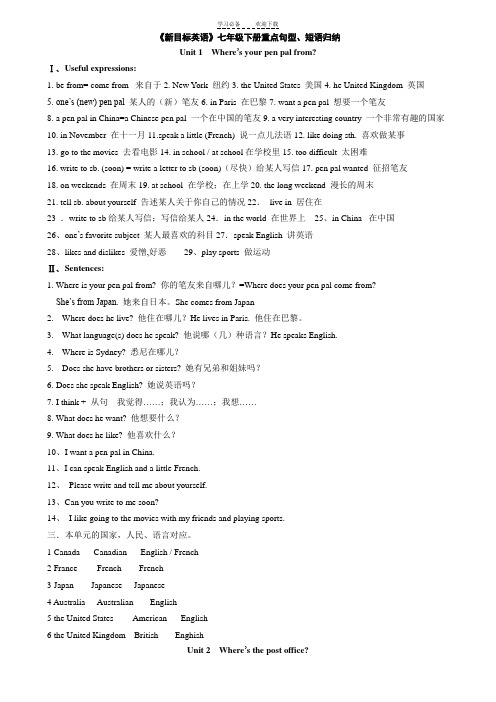
《新目标英语》七年级下册重点句型、短语归纳Unit 1 Where’s your pen pal from?Ⅰ、Useful expressions:1. be from= come from 来自于2. New York 纽约3. the United States 美国4. he United Kingdom 英国5. one’s (new) pen pal 某人的(新)笔友6. in Paris 在巴黎7. want a pen pal 想要一个笔友8. a pen pal in China=a Chinese pen pal 一个在中国的笔友9. a very interesting country 一个非常有趣的国家10. in November 在十一月11.speak a little (French) 说一点儿法语12. like doing sth. 喜欢做某事13. go to the movies 去看电影14. in school / at school在学校里15. too difficult 太困难16. write to sb. (soon) = write a letter to sb (soon)(尽快)给某人写信17. pen pal wanted 征招笔友18. on weekends 在周末19. at school 在学校;在上学20. the long weekend 漫长的周末21. tell sb. about yourself 告述某人关于你自己的情况22.live in 居住在---23 .write to sb给某人写信;写信给某人24.in the world 在世界上25、in China 在中国26、one’s favorite subject 某人最喜欢的科目27.speak English 讲英语28、likes and dislikes 爱憎,好恶29、play sports 做运动Ⅱ、Sentences:1. Where is your pen pal from? 你的笔友来自哪儿?=Where does your pen pal come from?She’s from Japan. 她来自日本。
新目标go,for,it,七年级下册单元单词及知识点

新目标go,for,it,七年级下册单元单词及知识点篇一:新版新目标英语七年级下册各单元知识点汇总新版新目标英语七年级下册各单元知识点汇总Unit 1 Can you play the guitar1. guitar为一种乐器,注意play与表示乐器的名词连用时,前要加定冠词the。
2. join意为―参加(某个组织成为其成员)‖,一般常和介词in连用。
3. have a swim游泳;go swimming去游泳4. ―下棋‖用play chess,而不用play the chess。
5. Painted 派生词:painter n.画家 painting n.画(注意与draw的区别: paint指用颜料等绘画;而draw指用钢笔、铅笔等画。
)6. 注意区分:speak,say,talk和tella) ①say指用语言表达思想,着重说话的内容或强调说话这一动作,不表示说话的性质。
b) ②speak强调说话的动作、声音,而不强调内容。
在正式场合表示发言、演讲,说某种语言用speak。
c) ③talk表示两个人或多个人在一起讲话、谈论(多指随意谈论)。
d)④tell的意思是―告诉,讲述,吩咐‖,讲故事或讲笑话多用tell。
7. 弹钢琴要用play the piano,其中定冠词the不能省略。
8. Show 用法:show作动词,意为―表演,演出,出示……给某人看‖,有时与介词搭配使用,构成show sth. to sb.=show sb. sth.。
show作名词,意为―展览,展出‖。
构成短语on show,意为―在展出‖。
9. 表示―在星期几‖要用介词on。
如:on Sunday―在星期日‖。
10. Little 用法:1)little还有―小的,小巧的‖之意,带有小的可爱之意。
2)注意little与a little 的区别:little与a little都可表示数量,修饰不可数名词。
但little表示否定意义,而a little表示肯定意义。
人教版新目标七八年级英语重点常见语法单词
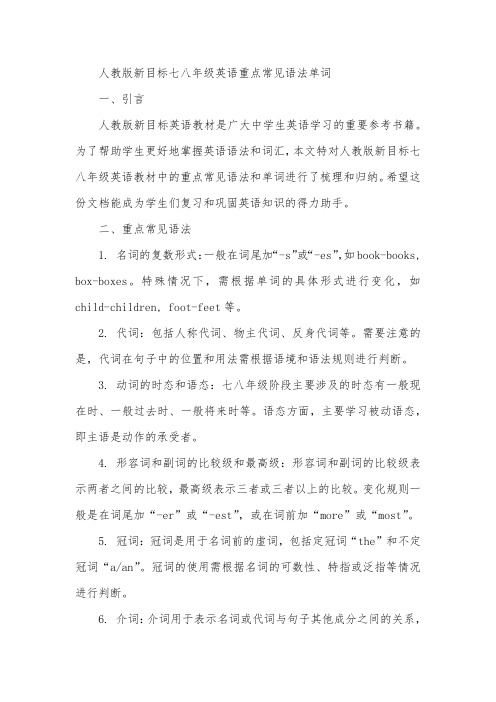
人教版新目标七八年级英语重点常见语法单词一、引言人教版新目标英语教材是广大中学生英语学习的重要参考书籍。
为了帮助学生更好地掌握英语语法和词汇,本文特对人教版新目标七八年级英语教材中的重点常见语法和单词进行了梳理和归纳。
希望这份文档能成为学生们复习和巩固英语知识的得力助手。
二、重点常见语法1. 名词的复数形式:一般在词尾加“-s”或“-es”,如book-books, box-boxes。
特殊情况下,需根据单词的具体形式进行变化,如child-children, foot-feet等。
2. 代词:包括人称代词、物主代词、反身代词等。
需要注意的是,代词在句子中的位置和用法需根据语境和语法规则进行判断。
3. 动词的时态和语态:七八年级阶段主要涉及的时态有一般现在时、一般过去时、一般将来时等。
语态方面,主要学习被动语态,即主语是动作的承受者。
4. 形容词和副词的比较级和最高级:形容词和副词的比较级表示两者之间的比较,最高级表示三者或三者以上的比较。
变化规则一般是在词尾加“-er”或“-est”,或在词前加“more”或“most”。
5. 冠词:冠词是用于名词前的虚词,包括定冠词“the”和不定冠词“a/an”。
冠词的使用需根据名词的可数性、特指或泛指等情况进行判断。
6. 介词:介词用于表示名词或代词与句子其他成分之间的关系,如时间、地点、方式等。
常见的介词有in, on, at, for, with等。
7. 句子成分和句子类型:了解句子的基本成分(主语、谓语、宾语等)以及各种句子类型(陈述句、疑问句、祈使句、感叹句)的特点和使用方法。
三、重点常见单词1. 学习用品类:book, pen, pencil, ruler, eraser, backpack 等。
2. 家庭成员类:father, mother, brother, sister, grandfather, grandmother等。
3. 数字类:one, two, three, four, five, six等。
新目标英语七年级 (下)Unit 7 知识要点归纳

新目标英语七年级(下)Unit 7 知识要点归纳作者:来源:《中学生英语·七年级》2020年第05期一、重点词汇rain v. 下雨 n. 雨水 snow v. 下雪 n. 雪 windy adj. 有风的;多风的cloudy adj. 多云的 sunny adj. 晴朗的 weather n. 天气dry adj. 干燥的 cold adj. 寒冷的;冷的 hot adj. 热的warm adj. 温暖的 soon adv. 不久;很快 hard adv. 努力地 adj. 困难的skate v. 滑冰 visit v. 拜访;参观 message n. 信息;消息summer n. 夏天;夏季 winter n. 冬天;冬季 vacation n. 假期二、重点词组take a message 捎个口信;传话 call (sb.) back (给某人)回电话have a good time玩得开心 on (a) vacation 度假right now 此刻;马上 no problem 没有问题study hard 努力学习 visit friends 拜訪朋友not too bad 不算太坏 play computer games 玩电脑游戏三、重点难点分析—How is the weather in Beijing?北京的天气怎么样?—It’s sunny. 天气晴朗。
1. weather作名词意为“天气”,是不可数名词,前面不能用不定冠词修饰。
例如:What fine weather!多好的天气啊!2. 询问天气用How is the weather?或What’s the weather like?来表示。
回答一般用It’s...。
例如:—What’s the weather like in Shanghai?/How is the weather in Shanghai?上海是什么天气?—It’s cloudy. 多云。
新目标人教版英语七年级上下册重点语法总结
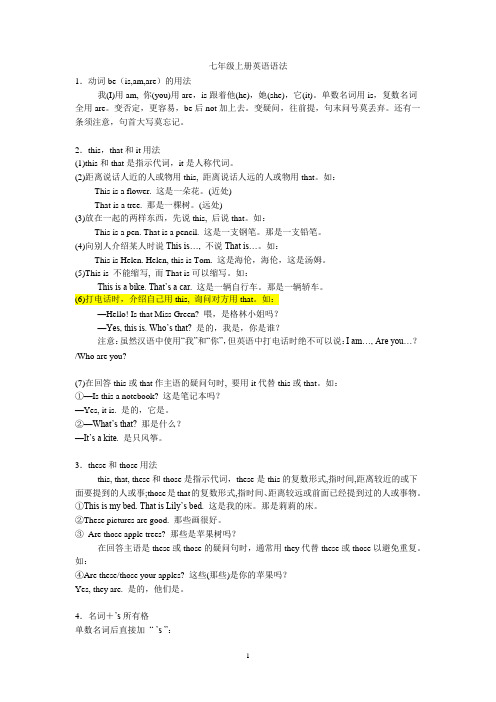
七年级上册英语语法1.动词be(is,am,are)的用法我(I)用am, 你(you)用are,is跟着他(he),她(she),它(it)。
单数名词用is,复数名词全用are。
变否定,更容易,be后not加上去。
变疑问,往前提,句末问号莫丢弃。
还有一条须注意,句首大写莫忘记。
2.this,that和it用法(1)this和that是指示代词,it是人称代词。
(2)距离说话人近的人或物用this, 距离说话人远的人或物用that。
如:This is a flower. 这是一朵花。
(近处)That is a tree. 那是一棵树。
(远处)(3)放在一起的两样东西,先说this, 后说that。
如:This is a pen. That is a pencil. 这是一支钢笔。
那是一支铅笔。
(4)向别人介绍某人时说This is…, 不说That is…。
如:This is Helen. Helen, this is Tom. 这是海伦,海伦,这是汤姆。
(5)This is 不能缩写, 而That is可以缩写。
如:This is a bike. That’s a car. 这是一辆自行车。
那是一辆轿车。
(6)打电话时,介绍自己用this, 询问对方用that。
如:—Hello! Is that Miss Green? 喂,是格林小姐吗?—Yes, this is. Who’s that? 是的,我是,你是谁?注意:虽然汉语中使用“我”和“你”,但英语中打电话时绝不可以说:I am…, Are you…?/Who are you?(7)在回答this或that作主语的疑问句时, 要用it代替this或that。
如:①—Is this a notebook? 这是笔记本吗?—Yes, it is. 是的,它是。
②—What’s that? 那是什么?—It’s a kite. 是只风筝。
3.these和those用法this, that, these和those是指示代词,these是this的复数形式,指时间,距离较近的或下面要提到的人或事;those是that的复数形式,指时间、距离较远或前面已经提到过的人或事物。
新目标英语七年级下册Unit6_I’m_watching_TV知识点

新⽬标英语七年级下册Unit6_I’m_watching_TV知识点Unit 6 I’m watching TV.词组◆watch TV 看电视◆read a newspaper 读报纸◆talk on the phone◆listen to a CD 听CD◆use the computer 使⽤电脑◆make soup/ zongzi 做汤/粽⼦◆wash the dishes=do the dishes 洗碗◆go to the movies=see a film=go to cinema 看电影(3种表达)看书看电视看我◆Not much.=Nothing much 没有什么。
◆wash one’s clothes 洗⾐服◆eat out 出去吃◆meet at my home◆ see you then 到时见◆talk about sth 谈论某事Talk sb 和某⼈谈话◆in the tree 在树上(树外之物)◆on the tree 在树上(树上长出来的)◆drink tea◆do some cleaning/reading 做清洁/阅读◆in the United States= in the US 在美国◆ Dragon Boat Festival: 端午节◆live with sb. 和……住在⼀起住在成都◆boat races◆any other night 其他任何⼀个夜晚(any other + 可数名词any other night / picture / singer)◆host family 寄住家庭◆miss one’s family 想念家⼈◆ wish to do sth 希望做某事◆ talk on the phone 在电话上交谈◆ That sounds good. 那听起来不错◆ wait for sb 等待某⼈◆ a useful book ⼀本有⽤的书◆ study for a test 为⼀个考试⽽学习study for sth. 为了什么⽽学习◆ Be like 像sound like 听起来像look like 看起来像◆对某⼈友好◆thanks for = thank you for… 为某事⽽感谢◆ Wha t’s he doing? 他正在⼲嘛?◆He’s reading. 他正在阅读。
- 1、下载文档前请自行甄别文档内容的完整性,平台不提供额外的编辑、内容补充、找答案等附加服务。
- 2、"仅部分预览"的文档,不可在线预览部分如存在完整性等问题,可反馈申请退款(可完整预览的文档不适用该条件!)。
- 3、如文档侵犯您的权益,请联系客服反馈,我们会尽快为您处理(人工客服工作时间:9:00-18:30)。
二.Showing the ways: Байду номын сангаас指路)
1. Go straight down / along this street. 沿着这条街一直走。
2. Turn left at the second turning. 在第二个路口向左转。
3. You will find it on your right. 你会在你右手边发现它。
我昨天玩得很开心。 I had fun yesterday.
I had a good time yesterday.
I enjoyed myself yesterday.
14. have a good trip 旅途愉快
15. take a taxi 坐出租车
16. 到达:get to +地方 get here/ there/ home 到这/那/家
8.He sleeps during the day, but at night he gets up and eats leaves.
9.He usually sleeps and relaxes 20 hours every day.
10.Let’s see the pandas first.
There are many kinds of tigers in China.
There are many kinds of scary animals in Africa.
3、friendly adj. 友好的,和蔼可亲的
它是名词friend的形容词形式,常常和be动词连用, be friendly。
I like dogs, too.
Why?
Because they’re friendly and clever.
5. Molly likes to play with her friends and eat grass.
6. She’s very shy.
7. He is from Australia.
4. It is about one hundred metres from here. 离这里大约一百米远。
5. You’d better take a bus. 你最好坐公交车去。(You’d better+动词原形)
三.词组
1. across from …… 在……的对面 across from the bank 在银行的对面
通常说in the day, during the day, at night。
18.on + 街道的名称。 Eg: on Center Street
at + 具体门牌号+街道的名称 Eg: at 6 Center Street
三.重难点解析
1.enjoy doing sth 享受做某事的乐趣,喜爱做某事
I enjoy reading. 我喜爱读书。
到目前为止,我们学了两个特殊的动词finish和enjoy,都是要带 doing.
四.本单元的反义词、近义词配对
1new—old 2 quiet--- busy 3 dirty--- clean 4 big---- small
Unit 3 Why do you like koala bears?
一.重点词组
eat grass eat leaves be quiet very shy very smart very cute
I finish cleaning the room. 我扫完了这间屋子。
2.hope to do sth 希望做某事 I hope to pass this exam. 我希望通过这次考试。
hope +从句 I hope tomorrow will be fine. 我希望明天将会晴朗。
(从句即是一个小句子,这个小句子又放在大句子中,从属于大句子,所以叫从句。如tomorrow will be fine是一个从句,它又放在I hope 的后面,形成句中有句。)
play with her friends kind of South Africa other animals
at night in the day every day during the day
二. 交际用语
1. Why do you like pandas? Because they’re very clever.
5 the United States------ American---- English
6 the United Kingdom---British----- Enghish
Unit 2 Where’s the post office?
一. Asking ways: (问路)
1. Where is (the nearest) ……? (最近的)……在哪里?
5 .in the world 在世界上 in China 在中国
6.pen pal 笔友 14 years old 14岁 favorite subject 最喜欢的科目
7.the United States 美国 the United Kingdom 英国 New York 纽约
8.speak English 讲英语 like and dislike 爱憎
behind my house 在我家后面
6. turn left/ right 向左/右拐
on the left/right of…… 在某物的左/右边
on the left of our school 在我们学校的左边
on one’s left/right 在某人的左/右边
The people in Chengdu are very friendly.
4、with prep. 跟,同,和…在一起
I usually play chess with my father.
注意区别与and的用法,and通常用于连接主语或宾语,连接主语时,
如果有I, I通常放在 and 之后,如:
2. next to…… 紧靠…… next to the supermarket 紧靠超市
3. between……and…… 在……和……之间
between the park and the zoo 在公园和动物园之间
among 表示位于三者或三者以上之间
4. in front of…… 在……前面
4 I want a pen pal in China.
5 I can speak English and a little French.
6 Please write and tell me about yourself.
7 Can you write to me soon?
8 I like going to the movies with my friends and playing sports.
kind 还有“种类”的意思
如:各种各样的 all kinds of
We have all kinds of beautiful flowers in our school.
2、China n. 中国 Africa n. 非洲
China 和Africa都是专有名词,首字母都应该大写,而且和介词in连用。
My father and I usually play chess together.
Play with “和…一起玩耍”“玩…”
I often play with my pet dog.
Don’t play with water!
5、day和night 是一对反义词,day 表示白天或一天,night表示夜或夜晚。
11.They’re kind of interesting.
12.What other animals do you like?
13.Why do you want to see the lions?
三. 重点难点释义
1、kind of 有点,稍微
Koala bears are kind of shy. 考拉有点害羞。
2. Can you tell me the way to ……? 你能告诉我去……的路吗?
3. How can I get to ……? 我怎样到达……呢?
4. Is there …… near here / in the neighborhood? 附近有……吗?
5. Which is the way to ……? 哪条是去……的路?
2. Why does he like koalas? Because they’re kind of interesting.
3. Where are lions from? They are from South Africa.
4. What other animals do you like?
arrive in +大地方 I arrive in Beijing.
arrive at +小地方 I arrive at the bank.
reach +地方
17.go across 从物体表面横过 go across the street 横过马路
go through 从空间穿过 go through the forest 穿过树林
11. take /have a walk 散步
12. the beginning of…… ……的开始,前端
at the beginning of…… 在……的开始,前端
